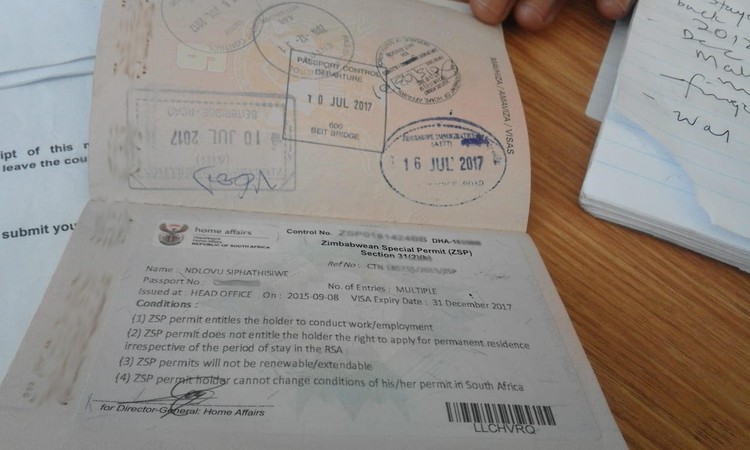A Zimbabwean mother just wanted her son to join her in SA. Now she is caught up in child trafficking charges
Siphathisiwe Ndlovu, who has been in South Africa since 2007, has now been denied a permit to stay
Siphathisiwe Ndlovu, a 42-year-old Zimbabwean woman, has been turned down for the new Zimbabwe Exemption Permit (ZEP). She appears to be guilty of child trafficking in the eyes of the authorities, when all she wanted to do was bring her 9-year-old son to join her in Cape Town. Now, she faces an uncertain future as an undocumented immigrant.
Ndlovu previously qualified for the Dispensation of Zimbabwean Permit, issued to her in March 2013, and then the Zimbabwe Special Permit, issued to her in September 2015. But in June this year, the Department of Home Affairs rejected her application for a ZEP. The grounds she was given were: “Afiswitch report /police clearance: awaiting trial”, with the comment: “negative police reports”.
Afiswitch is the national provider of information on previous convictions and people awaiting trial checked against the South African Police Service (SAPS) fingerprint database.
Ndlovu says she has never been arrested or appeared before any court. She also has no knowledge of any summons to appear.
Her troubles seem to date back to December 2011. She had engaged a man to bring her child from Zimbabwe. He had collected 13 children in Gweru and Bulawayo, including Ndlovu’s son, at the request of their parents. But he was intercepted by South African police in Mahikeng. The children were taken into the care of the South African state and put in a home in Rustenburg.
Ndlovu went to North West Province and spent two days trying to see her child, but the authorities refused her access.
“It left me really worried. How could they deny me a chance to speak to my child? Yet I had proof to show that I am the biological mother?” she asks.
The children were sent back to Zimbabwe in March 2012.
The man who transported the children confirmed Ndlovu’s story, but spoke to GroundUp on condition of anonymity. “My case was over in 2013,” he said.
According to Captain Tlangeni Rikhotso, spokesperson for the Hawks North West Province, the man was found guilty of trafficing people, and sentenced to five years imprisonment or a fine of R5,000. He paid the fine.
However, the Director of Public Prosecutions instructed that the parents of the children be charged for aiding the “trafficker”. Rikhotso says the investigator subpoenaed the parents to appear in court. The other parents came to court, but Ndlovu, she says, did not cooperate. There is currently a warrant of arrest for Ndlovu due to her failure to appear in court.
But Ndlovu says the Mahikeng police officer dealing with the case has been in contact with her several times without arresting her. She says in 2014 he came to Cape Town and told her to meet him at Strand police station where he took her fingerprints. He told her it was to verify she was the mother of the child. In 2015, she was issued a ZSP.
“I am a single mother of three. I am not sure how I will manage the school fees and food for the children,” she says. “I won’t go back to Zimbabwe.”
Department of Home Affairs media liaison officer Thabo Mokgola said the department would review the decision, but Ndlovu would have to get proof from the court that the case against her had been dropped.
EDITORIAL: The other side of anti-trafficking legislation
The first thing that springs to mind for many people when they hear the term human trafficking is a modern day slave trade with syndicates of evil thugs smuggling women or children for sex.
Anti-trafficking organisations trade on this trope. But most trafficking isn’t about this. Instead, anti-trafficking legislation is being used as a way to block poor people moving between countries, looking for better opportunities for themselves and their children.
And what fuels “trafficking” and human “smuggling” are anti-immigration policies.
GroundUp first reported on this in 2013, when six undocumented Zimbabwean minors were intercepted and held by police with total disregard for the South African Children’s Act. Earlier this year, GroundUp reported how eight Zimbabwean children, aged between two and twelve, were similarily held for months in custody. Siphathisiwe Ndlovu’s story is yet another example of how anti-trafficking legislation in South Africa is used to stop migration, to restrict desperate people in search of a better life or who are simply trying to unite their families.
Support independent journalism
Donate using Payfast

Don't miss out on the latest news
We respect your privacy, and promise we won't spam you.
© 2018 GroundUp.
This article is licensed under a Creative Commons Attribution-NoDerivatives 4.0 International License.
You may republish this article, so long as you credit the authors and GroundUp, and do not change the text. Please include a link back to the original article.

